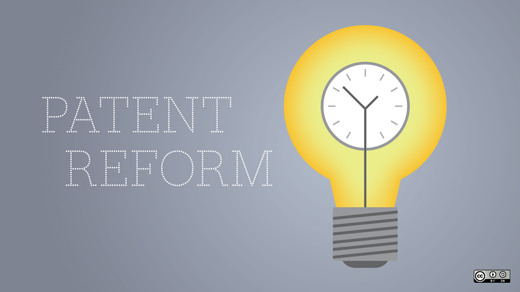The Federal Trade Commission (FTC) is finally on the cusp of its long-anticipated study to examine the harmful effects of Patent Assertion Entities (PAEs).
In May, the FTC released its revised proposed order—formally known as a '6(b) study' and often informally referred to an 'industry study'—following lengthy comments last fall which were strongly supportive of the FTC action. Now, the FTC is at the next-to-final step, and public comments are needed one more time to get the study out of the gate.
Why? Due to the intricacies of the Paperwork Reduction Act, the Office of Management and Budget (OMB) must now grant approval to the FTC to conduct the study. OMB is seeking public input on whether to do so, which is why public comments at this stage are again needed. If you feel such a study is important and needed, I urge you to share your views with OMB. Comments on the revised order are due on or before June 18 and can be filed electronically.
The importance of the FTC action
As I’ve written previously on Opensource.com, the FTC action is potentially an historic move by the agency. It is the culmination of extensive outreach and work by the FTC and the Antitrust Division of the United States Department of Justice (DOJ). The FTC was an early voice of "skepticism" regarding PAE practices, as reflected in its seminal IP Market Place report in 2011.
In the past, such industry studies have led to major policy actions by the FTC, even reforms by Congress and the judiciary, including looking at entry into the generic drug market (pay-for-delay). This industry study, where the FTC plans to collect information regarding the acquisition, assertion, litigation, and licensing practices of PAEs, could have wide-reaching implications for antitrust enforcement and policy over the next decade.
Leadership on this important issue has come from the top of the Agency. Last summer, FTC Chairwoman Edith Ramirez laid out the FTC's roadmap on patent litigation aggressors that included undertaking this investigation.. The two areas of study, reflecting FTC concerns, are likely to focus on third-party nuisance suits and 'privateering'.
The FTC actions reflect in more detail the concerns laid out by President Obama last year.
The investigation will utilize the FTC’s unique authority to explore in more depth what the FTC sees as the indirect costs of PAEs. As Chairwoman Ramirez stated, these costs "distort incentives to innovate" including, for example, "patents asserted against existing products [that] raise the risk of patent hold-up." Also at the top of the list could be whether "particularly in the high-tech sector, where patent notice is notoriously difficult, licensing fees ... reflect investments the implementer has made to bring a product to market, rather than the true economic value of the patent."
Moreover, the 6(b) study would be able to dig into details of the pre-litigation activity of PAEs, which she noted "are always negotiated in the shadow of the law." To date, the data available on PAE activities has largely focused on litigation issues. Certainly, getting to the bottom of the magnitude of the return to the actual inventors and startups would be a key objective, which Chairwoman Ramirez acknowledged in June recent speech ("empirical evidence of the magnitude of the return to inventors and start-ups was largely absent" from publicly available data.)
The modified 6(b) Order
As noted above, the comments received by the FTC in December were strongly supportive of their undertaking this study. And the support came from a wide and broad representation of our economy, including consumer electronics, traditional marketing firms, restaurants, Internet and online commerce, telecom, software, a variety of retailers, grocers, and consumer groups as well as state Attorneys General and some well-known free-market, conservative voices.
The modified 6(b) Order reflects some (certainly a small minority) of comments received by the FTC about the 'burdensomeness' of the requests. As a result, the FTC took some steps to:
- minimize the collection of publicly available patent data from study respondents
- clarify that the study will include two case studies: one describing PAE activity generally, and one that compares PAE assertion activity to that of manufacturers and non-practicing entities in the wireless chipset sector
- simplify and narrow many study questions (and created a spreadsheet that will enable study respondents to more easily respond to the information requests}
- narrow the study timeframe by one year
In my view, the FTC has bent over backwards to accommodate these comments and concerns. Red Hat supported the original Order.
My assessment is that the changes do not materially affect the ability of the FTC to undertake this important action and begin its 6(b) study.
The FTC continues to emphasize the importance of its action, most recently in testimony before Congress last month. And, newly installed FTC Commissioner Terrell McSweeny has indicated the FTC’s work on PAE is a high priority. Prior to joining the FTC, she served as Chief Counsel for Competition Policy and Intergovernmental Relations DOJ and was involved in organizing the joint workshop on the subject.
As Chairwoman Ramirez has pointed out on several occasions, the FTC role is "just one piece of a broader response." Indeed, as she has observed, "Flaws in the patent system are likely fueling much of the real costs associated with PAE activities. ... effective monetization of low quality patents imposes a de facto tax on productive economic activity with little or no offsetting benefit for consumers. High litigation costs add to the problem by allowing PAEs to coerce targets to pay license or settlement fees that are detached from the economic value of the patents at issue. In short, PAEs exploit underlying problems in the patent system to the detriment of innovation and consumers." [emphasis added.]
But, as she concludes, "more can and should be done." However, more cannot be done until the FTC receives approval to proceed with the study. If you agree, let your voice be heard. Share your views with OMB by June 18, at the link above.







Comments are closed.